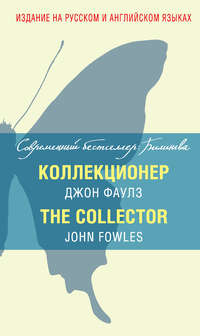
Полная версия
The French Lieutenant's Woman / Любовница французского лейтенанта
Very gently, with his hand on her elbow, he led her forward on to the level turf above the sea. She wore the same black coat, the same indigo dress with the white collar. The wind had blown her hair a little loose. Suddenly she looked at Charles, a swift sideways and upward glance from those dark-brown eyes with their clear whites. It made him drop her arm.
“I dread to think, Miss Woodruff, what would happen if you should one day turn your ankle in a place like this.”
“It does not matter.”
She stared at the turf, as if she would answer no more questions; begged him to go. But there was something in that face that made him not to go. It was in her eyes. They could not conceal an intelligence, an independence of spirit; there was also a determination to be what she was. Her face was well modeled, and completely feminine; there was sensuality of her wide mouth, which he noted.
He associated her face with foreign women, rather with foreign beds. This marked a new stage of his awareness of Sarah.
Also, Charles had the advantage of having read – very much in private, for the book had been prosecuted for obscenity – a novel that had appeared in France some ten years before; the celebrated Madame Bovary. And as he looked down at the face beside him, it was suddenly that Emma Bovary's name came into his mind. Such allusions are temptations. That is why, finally, he did not bow and go away.
At last she spoke.
“I did not know you were here.”
“How should you?”
“I must return.”
And she turned. But he spoke quickly.
“Will you permit me to say something first? Something I have perhaps, as a stranger to you and your circumstances, no right to say.” She stood with bowed head, her back to him. “May I proceed?”
She was silent. He hesitated a moment, then spoke.
“Miss Woodruff, I cannot pretend that your circumstances have not been discussed in front of me by Mrs. Tranter. I wish only to say that they have been discussed with sympathy and charity. She believes you are not happy in your present situation. I have known Mrs. Tranter only a very short time. I am confident – ”
He broke off as she looked quickly round at the trees behind them. Her sharper ears had heard a sound, a branch broken underfoot. But before he could ask her what was wrong, he too heard men's low voices. But by then she had already acted; gathering up her skirt she walked swiftly over the grass to the east, some forty yards; and there disappeared behind a thicket of gorse[117]. Charles stood dumbfounded.
The men's voices sounded louder. He went up the upper path and soon two faces, looking up, came into his sight. Charles opened his mouth to bid them good day; but the faces disappeared quickly.
He waited a minute, until he was certain they had gone, then he walked round to the gorse. She stood pressed against the sharp needles, her face turned away.
“They have gone. Two poachers, I fancy.”
She nodded, but continued to avoid his eyes. The gorse was in full bloom, the yellow flowers so dense they almost hid the green. The air was full of their honeyed scent.
He said, “I think that was not necessary.”
“No gentleman who cares for his good name can be seen with the scarlet woman[118] of Lyme.”
And there was a bitterness in her voice. He smiled at her averted face.
“I think the only truly scarlet things about you are your cheeks.”
Her eyes flashed at him then, as if he were torturing some animal. Then she turned away again.
Charles said gently, “Do not misunderstand me. I feel sorry for your unfortunate situation.”
She did not move.
“My dear Miss Woodruff, I have seen a good deal of life. And I have a long nose for bigots. There is no impropriety in our meeting in this chance way. And you must allow me to finish what I was about to say.”
He stepped aside and she walked out again onto the turf. He saw that her eyelashes were wet.
“Mrs. Tranter would like to help you, if you wish to change your situation.”
Her only answer was to shake her head.
“No one is beyond help who inspires sympathy in others.” He paused. “I am merely saying what I know Mrs. Tranter would wish to say herself.”
Charles was not exaggerating; for during the lunch that followed the reconciliation, Mrs. Poulteney and Sarah had been discussed.
“You should leave Lyme… this district. I understand you have excellent qualifications.” Sarah made no response. “I know Miss Freeman and her mother would be most happy to make inquiries[119] in London.”
She walked away from him then, to the edge of the cliff meadow; and stared out to sea a long moment; then turned to look at him still standing by the gorse. She lowered her eyes. “I thank you. But I cannot leave this place.”
He gave the smallest shrug. “Then once again I have to apologize for intruding on your privacy. I shall not do so again.”
He bowed and turned to walk away. But he had not gone two steps before she spoke.
“I. I know Mrs. Tranter wishes to be kind.”
“Then permit her to have her wish.”
She looked at the turf between them.
“Such kindness is crueler to me than – ”
She did not finish the sentence, but turned to the sea looking at a distant brig. Charles felt a great desire to reach out and take her shoulders and shake her.
“Miss Woodruff, let me be frank. I have heard it said that you are… not altogether of sound mind[120]. I think that is very far from true. I believe you simply judged yourself for your past conduct too severely. Now why in heaven's name must you always walk alone? Have you not punished yourself enough? You are young. You are able to gain your living[121]. You have no family ties, I believe, that confine you to Dorset.”
“I have ties.”
“To this French gentleman?” She turned away, as if that subject was banned. “Permit me to insist. If he does not return, he was not worthy of you. If he returns, I believe that he will find out where you are and follow you there. Now is that not common sense?”
There was a long silence. Her expression was strange, almost calm.
She remained looking out to sea, then spoke quietly.
“He will never return.”
“You fear he will never return?”
“I know he will never return.”
“I do not take your meaning[122].”
She turned then and looked at Charles's puzzled and anxious face. Then she looked away.
“I have long since received a letter. The gentleman is.” and again she was silent. Suddenly she was walking, almost running, across the turf towards the path.
“Miss Woodruff!”
She took a step or two more, then turned. Her voice had a pent-up harshness.
“He is married!”
“Miss Woodruff!”
But she took no notice[123]. He was left standing there. What was unnatural was his sense of guilt. It was as if he had shown lack of sympathy, when he was quite sure he had done his best[124]. He stared after her several moments after she had disappeared. Then he turned and looked at the distant brig, as if that might give an answer to this enigma. But it did not.
17
That evening Charles found himself seated between Mrs. Tranter and Ernestina in the Assembly Rooms. He and his ladies were in the building for a concert. It was not, of course – it being Lent – a secular concert, the program was religious.
Our three had come early; for these concerts were really enjoyed as much for the company as for the music. It gave the ladies an excellent opportunity to assess and comment on their neighbors' finery; and of course to show off their own. Even Ernestina, with all her contempt for the provinces, fell a victim to this vanity[125]. At least here she knew she would have few rivals in the taste and luxury of her clothes. She was in a mischievous mood that evening as people came in. According to Ernestina, there were far more gooseberries than humans patiently waiting for the concert to begin. Every decade invents such a useful epithet; in the 1860s “gooseberry” meant “all that is dreary and old-fashioned”. But at last the distinguished soprano from Bristol appeared, together with her accompanist, and Charles was free to examine his conscience.
In simple truth he had become a little obsessed with Sarah… or at any rate with the enigma she presented. He had – or so he believed – intended to tell them of his meeting – though of course on the strict understanding that they must speak to no one about Sarah's wanderings over Ware Commons. But somehow the moment had not seemed suitable.
He was well aware that Ernestina would feel jealousy. At worst, she would be angry with him; at best, she would only tease him. Charles could perhaps have told Mrs. Tranter. She, he knew, certainly shared his charitable concern. He could not ask her not to tell Ernestina; and if Tina should learn of the meeting through her aunt, then he would be in very hot water indeed. On his mood toward Ernestina that evening, he hardly dared to dwell. Her humor did not exactly irritate him, but it seemed unusually and unwelcomely artificial, as if it were something she had put on with her French hat. It also required a response from him: a corresponding twinkle in his eyes, a constant smile, also artificial. He caught himself stealing glances[126] at the girl beside him – looking at her as if he saw her for the first time, as if she were a total stranger to him. She was very pretty, charming… but was not that face a little characterless, a little monotonous? But this cruel thought no sooner entered Charles's head than he dismissed it[127].
His mind went back to Sarah, to visual images, attempts to recollect that face, that mouth. He said it to himself: It is the stupidest thing, but that girl attracts me. It seemed clear to him that it was not Sarah in herself who attracted him – how could she, he was betrothed – but some emotion, some possibility she symbolized. She made him aware of a deprivation. His future had always seemed to him of vast potential; and now suddenly it was a fixed voyage to a known place. She had reminded him of that.
Ernestina's elbow reminded him gently of the present. He smiled at her. She was so young, such a child. He could not be angry with her. After all, she was only a woman. There were so many things she must never understand: the richness of male life, the enormous difficulty of being one to whom the world was rather more than dress and home and children.
All would be well when she was truly his; in his bed and in his bank, and of course in his heart, too.
Sam, at that moment, was thinking the very opposite. It is difficult to imagine today the enormous differences then separating a lad born in the Seven Dials[128] and a carter's daughter from a Devon village. They had hardly a common language, so often did they not understand what the other had just said.
Yet this distance was not wholly bad. People knew less of each other, perhaps, but they felt more free of each other, and so were more individual.
Sam was contemptuous of anything that did not come from the West End of London. But deep down inside, it was another story. There he was a timid and uncertain person.
Now Mary was quite the reverse at heart. She was certainly dazzled by Sam to begin with: he was very much a superior being, and her teasing of him had been pure selfdefense before such obvious cultural superiority. But she had a basic solidity of character, a kind of self-confidence, a knowledge that she would one day make a good wife and a good mother; and she knew, in people, what was what. After all, she was a peasant; and peasants live much closer to real values.
Sam first fell for her because she was a summer's day after the drab dollymops[129] and gays who had constituted his past sexual experience. Self-confidence in that way he did not lack. He had fine black hair over very blue eyes and a fresh complexion. He was slim and well-built. Women's eyes seldom left him at the first glance. What had really knocked him a cock[130] was Mary's innocence. He suddenly wished to be what he was with her; and to discover what she was.
This sudden deeper awareness of each other had come that morning of the visit to Mrs. Poulteney. They had begun by discussing Mr. Charles and Mrs. Tranter. She thought he was lucky to serve such a lovely gentleman. Then Sam, to his own amazement, found himself telling this milkmaid something he had previously told only to himself.
His ambition was very simple: he wanted to be a haberdasher. He had never been able to pass such shops without stopping and staring in the windows. He believed he had a flair for knowing the latest fashion. He had traveled abroad with Charles, he had picked up some foreign ideas in the haberdashery field.
But for that he had neither money, nor education. Mary had modestly listened. Sam felt he was talking too much. But each time he looked nervously up for a sneer, he saw only a shy and wide-eyed sympathy. His listener felt needed[131], and a girl who feels needed is already a quarter way in love.
The time came when he had to go. It seemed to him that he had hardly arrived. He stood, and she smiled at him, a little mischievous again. He wanted to say that he had never talked so freely – well, so seriously – to anyone before about himself. But he couldn't find the words.
“Well. Dessay we'll meet tomorrow mornin'.”
“Happen so.”
“Dessay you've got a suitor an' all.”
“None I really likes.”
“I bet you 'ave. I 'eard you 'ave.”
“' Tis all talk in this ol' place.”
He fingered his bowler hat[132]. A silence. He looked her in the eyes. “I ain't so bad?”
“I never said 'ee wuz.”
Silence. He worked all the way round the rim of his bowler[133].
“I know lots o' girls. All sorts. None like you.”
“Taren't so awful hard to find.”
“I never 'ave. Before.” There was another silence. She would not look at him, but at the edge of her apron. “ 'Ow about London then? Fancy seein' London?”
She grinned then, and nodded.
“Expec' you will. When they're a-married orf hupstairs. I'll show yer round.”
“Would 'ee?”
He winked then, and she clapped her hand over her mouth. Her eyes looked at him over her pink cheeks.
“All they fashional Lunnon girls, 'ee woulden want to go walkin' out with me.”
“If you 'ad the clothes, you'd do. You'd do very nice.”
“Doan believe 'ee.”
“Cross my 'eart[134].”
Their eyes met and held for a long moment. He bowed and pressed his hat to his left breast.
“A demang[135], madymosseile.”
“What's that then?”
“It's French for tomorrow mornin' – where yours truly[136] will be waitin'.”
She turned then, unable to look at him. He stepped quickly behind her and took her hand and raised it to his lips. She snatched it away, and looked at it as if his lips might have left a sooty mark. Another look flashed between them. She bit her pretty lips. He winked again; and then he went.
Whether they met that next morning, in spite of Charles's prohibition, I do not know. But later that day, when Charles came out of Mrs. Tranter's house, he saw Sam waiting on the opposite side of the street. Charles made the Roman sign of mercy[137], and Sam uncovered, and once again placed his hat over his heart – his face bore a wide grin.
Which brings me to this evening of the concert nearly a week later. Sam was in that kitchen again. Unfortunately there was now a duenna present – Mrs. Tranter's cook. But she was fast asleep[138] in her chair in front of the opened fire of her range. Sam and Mary sat in the darkest corner of the kitchen. They did not speak. They did not need to. Since they were holding hands. On Mary's part it was self-protection, since she had found that it was only thus that she could stop the hand trying to feel its way round her waist. Why Sam should have found Mary so understanding is a mystery no lover will need explaining.
18
For two days Charles's hammers lay in his rucksack. But then, Ernestina had a migraine, and he found himself unexpectedly with another free afternoon. He hesitated a while; but the events that passed before his eyes as he stood at the window of his room were so few, so dull. There was little wind, little sunlight. He had intended to write letters, but he found himself not in the mood.
To tell the truth he was not really in the mood for anything.
Half an hour later he was entering the woods of Ware Commons. If he met Miss Woodruff, he would do, politely but firmly, what he ought to have done at that last meeting – that is, refuse to enter into conversation with her.
Конец ознакомительного фрагмента.
Текст предоставлен ООО «Литрес».
Прочитайте эту книгу целиком, купив полную легальную версию на Литрес.
Безопасно оплатить книгу можно банковской картой Visa, MasterCard, Maestro, со счета мобильного телефона, с платежного терминала, в салоне МТС или Связной, через PayPal, WebMoney, Яндекс.Деньги, QIWI Кошелек, бонусными картами или другим удобным Вам способом.
Примечания
1
что касается / относительно
2
пушечный ствол
3
отдали честь/должное
4
(фр.) Вот и всё
5
Она сделала умышленную паузу
6
Я принял фигуру за рыбака
7
(лат. муз.) медленно/спокойно
8
земляные холмы
9
никоим образом / никак
10
Швейцарские Альпы
11
вблизи и не спеша
12
попал в дурную компанию
13
принять священный сан
14
умел учуять ловушку
15
И не важно
16
некая миссие Фэрли
17
если бы так сложилась жизнь
18
по-своему
19
на пользу / к взаимной выгоде
20
не избежать её острого/орлиного взгляда
21
У него был талант красноречия
22
Римская чума (подразумевается католицизм)
23
Я должна думать о слугах
24
Не беспокойтесь
25
Подходящая кандидатура
26
последний раз взглянуть
27
доброе имя
28
единственный ребёнок
29
с незапамятных времён
30
переехать / сменить местожительство
31
пролив Ла-Манш
32
хуже, чем ничего
33
мелкий почерк
34
Чармут – деревня в западном Дорсете, Англия.
35
рекомендательное письмо
36
по своей/собственной воле
37
корабль, который выбросило на берег
38
ухватился за лонжерон
39
Но французу удалось завоевать расположение мисс Вудраф
40
обратный рейс
41
она позволила ей уйти без уведомления/предупреждения
42
она немного не в себе
43
Но надо было держать ответ перед богом
44
козырная карта
45
она поставили перед ней задачу
46
(лат. букв.) День гнева, день Страшного суда
47
Бог утешает нас во всех невзгодах.
48
ступила на стезю добра
49
(зд. и далее малограмотная речь лондонского кокни) Если будете стоять на ветру, сэр, то и не увидите
50
он может передумать
51
Да я близко к ней не подойду / Мне она и даром не нужна
52
цветущий; проклятый
53
Полагаю, ты употребляешь прилагательное в основном значении
54
я припечатаю башмак к задней части твоей жалкой фигуры
55
греческий профиль
56
Хороших манер и самопознания у него было не отнять
57
удалился
58
редкие обнажения горной породы, известные как голубой лиас
59
окаменелый морской ёж
60
Кобб – пристань в Лайме.
61
он о ней больше не вспоминал
62
широкополая шляпа
63
коробочки с лекарствами
64
тип карманных часов с крышкой
65
утолил жажду
66
Вальтер Скотт (1771–1832) – основоположник жанра исторического романа.
67
Джейн Остин (1775–1817) – английская писательница.
68
Фрэнсис Дрейк (1540–1596) – английский капитан, совершивший кругосветное плавание.
69
выгодная сделка/покупка
70
зарабатывала себе на жизнь
71
которые говорили в пользу
72
как бульдог, который сейчас вонзит зубы в ногу вора
73
это противоречило суждению старой леди
74
подголовная салфетка
75
Всевышний
76
не нарушала договорённость / держала слово
77
I wish it would not
78
Веркоммонз – малолюдное место свиданий парочек.
79
Иглокожие – морские донные животные.
80
но в том-то всё и дело
81
мысленно делала нос Эрнестине
82
Диалект, известный своим пренебрежением к местоимениям и суффиксам.
83
Просто спросил, который час
84
Он мнит себя Дон Жуаном
85
Ну и что из этого, мисс Тина?
86
Пока это не важно
87
Но если он будет заигрывать
88
Ничто, конечно, не могло заменить благородную кровь
89
высокое положение в обществе
90
с отличием сдал тайный экзамен
91
тысяча банковских счетов
92
посеять роковое зерно
93
Если вы определились с ролью старого холостяка, мистер Смитсон, вы должны в ней тренироваться
94
Я абсолютный, стопроцентный, прости Господи, последний дурак
95
Он был готов продолжать в том же духе
96
Омела – вечнозелёное растение, поцелуй под которым, по поверью, приносит вечную любовь.
97
просёлочная дорога
98
Нельзя ли мне вас сопровождать?
99
Всё, что у него осталось
100
Он чуть было не
101
наизготове
102





